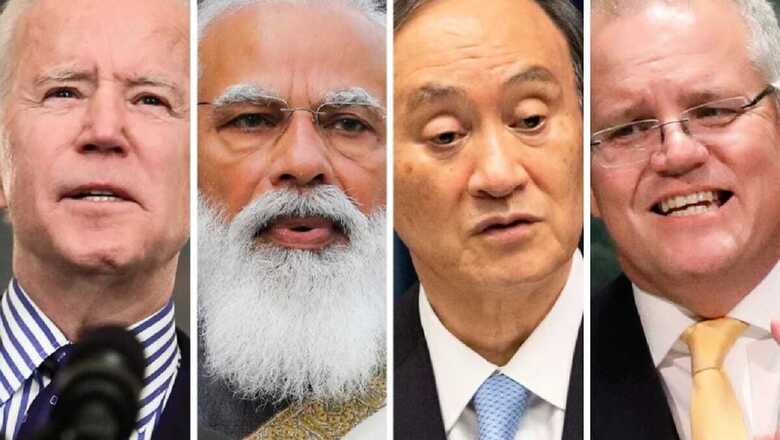
views
In a statement on March 12, 2021, the Quad leaders met and reaffirmed “our commitment to quadrilateral cooperation between Australia, India, Japan, and the United States”. Beijing will see this meeting as a significant step up in “containing China”, an attitude likely to harden stances between China and the countries of the region. Although it is far from being another NATO, there is no doubt this meeting moved the Quad in that direction.
Since its creation in 2004, the Quadrilateral Security Dialogue has striven to be a loose cooperation and has tried not to become an overtly security group along the lines of NATO. It is a fine line to tread, as the increasing focus of the Quad has been China.
The recent meeting was the first important global meeting convened and hosted by new US President Joe Biden, and significantly it was the first Quad meeting attended by all four national leaders. This is more than a symbolic step up for the Quad, and although there was a positive focus on collaboration to fight Covid-19 and climate change, it was also very much about China. Although the word “China” does not appear in the recent statement, all the language points to it – promote free, open rules based order, international law, counter threats, freedom of navigation and overflight, democratic values and meet challenges to the rules-based maritime order in the East and South China Sea. The US did not hold back in its language – US National Security Adviser Jake Sullivan, who sat in on the summit, declared “these four leaders made a massive joint commitment today”. “We have taken the Quad to a new level,” Sullivan said from the White House.
US diplomacy under Biden has focused strongly on Asia, with senior figures soon to meet with counterparts from Japan, India and China. Yet the Quad partners have diverse perspectives and perhaps very different reasons for coming together. Certainly, Chinese belligerence has been a big motivation. Japanese Prime Minister Yoshihide Suga spoke of feeling “emotional” about its re-emergence and the group’s dedication to realising a “free and open Indo-Pacific”. Indian Prime Minister Narendra Modi said, “The Quad has come of age. It will now remain an important pillar of stability in the region.” Australian Prime Minister Scott Morrison stressed the need for countries of the region to respect and support the “sovereignty, independence and security” of others. Finally, US President Biden said that nations should be “free of coercion”, whether economic, territorial, or through forms of foreign interference in their own jurisdictions.
Australia has been bruised and somewhat taken by surprise by the recent Chinese trade war which has seen a massive decline in Australian products in China – at the same time as Covid has hit the high paying international education market from China. When Prime Minister Morrison went public and alone in calling for an inquiry into the Chinese origins of Covid-19, the diplomatic lines of the two countries went blank and the trade war “punishment” from China rolled out – the two countries have not been speaking for some time. India on the other hand has close commercial and personal (leaders) ties with Japan, plus it has experienced border clashes with China in the Himalayan region.
The language of the joint statement expressed the enthusiasm of the four leaders: “Full of potential, the Quad looks forward to the future; it seeks to uphold peace and prosperity and strengthen democratic resilience, based on universal values.”
The Quad has a strengthened focus on technologies, cooperating to ensure that innovation is consistent with a free, open, inclusive and resilient Indo-Pacific. The four leaders also reaffirmed their commitment to the complete denuclearisation of North Korea in accordance with United Nations Security Council resolutions.
In another step up, the foreign ministers will meet at least once a year. It’s all about – in the Quad’s own words – “leveraging our partnership to help the world’s most dynamic region respond to historic crisis, so that it may be the free, open, accessible, diverse, and thriving Indo-Pacific we all seek”.
China will not like what it has seen from this meeting. For India and Australia, the meeting adds to their increasingly close relationship with Japan, boosted by recently creating a three-country working group to improve supply chain collaboration. Further bad news for China. China’s “close the doors” diplomacy (as seen with India and Australia) and punitive actions have certainly added urgency to the Quad dialogue and might in the end be regretted in Beijing. But, of course, how would we know – when the doors are closed there is no diplomacy or discussion with China.
Read all the Latest News, Breaking News and Coronavirus News here




















Comments
0 comment